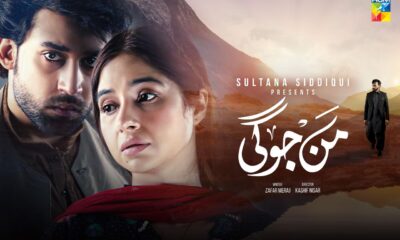Entertainment
Kashmir HUM Women Leaders Award Honours Nine Iconic Women and Two Dynamic Men from Pakistan and Abroad

In the midst of beautiful ambience and the anticipation of the audience, the highly-awaited fifth edition of the Kashmir HUM Women Leaders Award concluded on a successful note, honouring eleven remarkable women and two dynamic men from Pakistan and abroad. The awards ceremony, held at the prestigious Jinnah Convention Centre in Islamabad, recognised the recipients for their outstanding contributions and achievements in various fields, including social work, healthcare, human rights, education, technology and entrepreneurship. The event was graced by esteemed dignitaries, including Dr. Arif Alvi, the President of the Islamic Republic of Pakistan, MNAs, bureaucrats, and socialites. Their presence further solidified the award ceremony’s reputation as the country’s most coveted women’s award.
The event commenced with the national anthem, followed by the hosts of the evening, Hamza Ali Abbasi and Sanam Saeed, inviting President of HUM Network, Sultana Siddiqui, to address the audience.
Amidst a resounding round of applause, Sultana Siddiqui, President, HUM Network, clad in an elegant black outfit, stepped on the stage, smiling and exuding radiance, in an atmosphere pulsating with anticipation of what was to come. She began her speech by thanking Arif Alvi, President, Islamic Republic of Pakistan and Samina Alvi, the first lady, along with the dignitaries and guests present on the occasion. The President expressed her heartfelt appreciation to the President Alvi for gracing the event with his presence.
During her speech, President, HUM Network, emphasised the need for awards such as the HUM Women Leaders Award, to amplify the accomplishments of exceptional women across diverse sectors, both nationally and globally. Pointing towards the significance of these awards, she underscored their role in spotlighting the remarkable advancements made by women and hailed the recipients as trailblazers and beacons of inspiration for future generations. Furthermore, she extended recognition to the international women awardees who have left an indelible mark in their fields, spreading the essence of female greatness worldwide. Ms. Siddiqui expressed optimism that this platform will serve as a catalyst for enhancing the status of women on a global scale.
“These women represent hope, resilience and inspiration for women worldwide. The event commemorates their contributions and accomplishments, aiming to ignite a fresh wave of female leadership.”
The Chief Guest for the evening, Dr. Arif Alvi, President of the Islamic Republic of Pakistan, delivered a compelling speech at the event, highlighting the significance of youth education and the crucial role of child upbringing in ensuring a safer and brighter future for women in Pakistan. Dr. Alvi underscored the crucial role of education in enabling women as well to effectively leverage these resources to realize their aspirations. Encouraging women leaders in attendance, he urged them to embrace mentorship roles, facilitating the empowerment of other women by sharing their expertise. Dr. Alvi emphasized the significance of women supporting and uplifting each other, fostering a culture of opportunity creation. His impassioned speech concluded with the assertion that education for women and children will be the cornerstone of our society’s future development.Bottom of Form
The awards ceremony kicked off with the hosts, Hamza Ali Abbasi and Sanam Saeed, recognizing the advisory committee of the HUM Women Leaders Award (HWLA), which included Ameena Saiyid, Rehana Hakeem, Amin Hashwani, Maliha Lodhi and Dr. Huma Baqai. Nine women and two men, recognized for their outstanding achievements both nationally and internationally, were honoured at the awards ceremony. Among the distinguished female awardees were Dr. Razia Korejo, Sheeba Najmi, Huma Fakhar, Dr. Amanay Asfour, Khursheed Bano, Bibi Amina, Sadiqa Salahuddin, Sheema Kirmani, and Namira Saleem. Additionally, Dr. Prof. Izzeldin Abuelaish and Dr. Amjad Saqib were acknowledged as the male recipients of this year’s awards. Sania Saeed, renowned for her exceptional contributions to media and arts, was honoured with the prestigious Kashmir Golden Plate award at the event.
The event featured extraordinary performances, beginning with Sahir Ali Bhagga and Aima Baig’s dynamic musical presentation, followed by Resham’s captivating dance performance, and concluding with Ahmed Jahanzaib’s enchanting melodic session.
The awards ceremony, scheduled to air worldwide on HUM Network in March 2024, aims to acknowledge and pay tribute to influential women from Pakistan and beyond, who are catalysts for change in their domains. These women represent hope, resilience and inspiration for women worldwide. The event commemorates their contributions and accomplishments, aiming to ignite a fresh wave of female leadership. Through the portrayal of their triumphs and the recognition of their obstacles, HWLA endeavours to promote gender equality, empowerment, and advancement for women everywhere.



